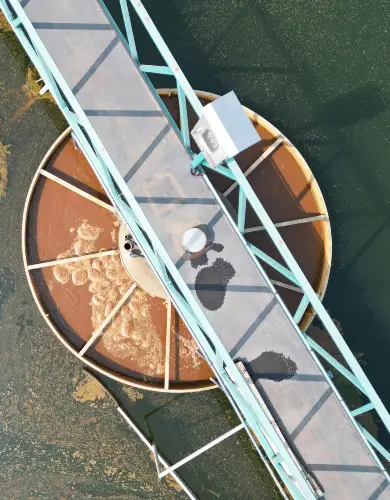Reducing your business’s water consumption
In the UK, the twin impact of a growing population and climate change puts severe pressure on water resources. Our guide explores the simple steps your company can take to reduce water waste.
Why should my business reduce water consumption?
There are three reasons why UK businesses should focus on reducing water consumption:
- Reducing your carbon footprint – The process of treating and pumping water in the UK network is highly energy-intensive. It is estimated that the greenhouse gas emissions of the regional water networks in the UK have an equivalent impact of 1.5 million cars on the road. If you want to know more, see our detailed article on the environmental impact of the water industry.
- Conserving water – The Environmental Agency warns that the UK could face water shortages by 2050 if households and businesses don’t take action to reduce consumption. Help the water scarcity problem by reducing consumption.
- Saving money – Business water rates are levied on a volumetric basis. Reduce the amount of water your business wastes, and you’ll save money on your business water bills.
How do I know how much water my business is using?
Most businesses in the UK don’t have a good idea of how much water they consume. A business property will have a water meter installed where the water network is connected to your building.
A water meter measures how much water goes into the property, and it is used by your business water supplier to calculate how much to charge you for water.
Unfortunately, water suppliers only read water meters every six months; this means it doesn’t work well for measuring patterns in water consumption and is almost useless in detecting increased usage that occurs during a water leak.
A solution is to implement automated water meter readings from a smart water meter.
What are the benefits of smart water meters?
A smart meter is simply a marketing term for a water meter that transmits water usage data in real-time. Most business water suppliers can arrange to fit an automatic meter reader to your current water meter to upgrade it to a smart meter.
A smart meter will continuously measure the water consumption, which you can access through an ‘online portal’. The online dashboard allows you to analyse real-time water data to understand the real impact of any water-saving initiatives that you introduced.
With a smart meter, you can also set up an alert system that will indicate if there have been any significant increases in water consumption. This is especially useful as an early warning indicator for commercial water leaks.
A smart meter can usually be fitted to your business property without interruption of your water supply.
A smart water meter gives businesses access to innovative new schemes like the rising block tariff that financially incentivises reduced water consumption.
How to reduce your business’s water consumption
At AquaSwitch, we love water savings. While a smart water meter lets you see where you can make changes to your water use, the only way to save water in any of your facilities is by physically reducing your water usage.
Cistern reduction devices
The cistern is the tank that sits on top of a toilet. A cistern reduction device reduces the amount of water used in each flush by reducing the volume of water held.
These devices are generally very cheap and effective, reducing up to three litres of water in each flush. We don’t endorse a particular brand, but as an example, wholesaler Northumbrian Water sells a number of these devices.
Tap Aerator
Tap Aerators are small, cheap devices that can be fitted to the end of taps to save on the amount of water used by up to 60%.
The aerator acts as a fine sieve that separates the water into many tiny streams surrounded by air. The mix of air and water ensures that there is no perceivable reduction in water pressure despite the reduced water coming out of the tap.
Rainwater harvesting
Now for a more involved but highly effective solution to reducing water consumption. Rainwater harvesting systems look to make use of rainwater collected from the roof of your business before using water you have to pay for from the water network.
Given the inclement weather in the UK, a rainwater harvesting system can greatly impact the amount of water your business purchases.
Rainwater harvesting works by collecting rainwater from your roof area and depositing it into an underground storage tank. A multi-stage filtration system, including UV disinfection, converts the water to the same high quality as your current supply.
When rainwater is available, this will be used by your property, only relying on the water network when the collected rainwater runs out.
Checking for toilet leakage
Leaking toilets are one of the most common sources of water waste in the office environment. Ever noticed the constant humming of a filling toilet or urinal? It’s a common problem that has been normalised over time.
If the refill valve of a toilet is not closing correctly, the toilet will constantly be using water from the cistern. A regular maintenance check of your toilets will easily identify and fix these problems.
A regular check for small leaks
The water network in an office building is extensive, which means leaks can occur in several places. And if your facilities also include gardens, warehouses or production plants, this effect may be compounded.
Make a practice of regularly checking in the back of cabinets and under basins for any signs of mould or foul smells that might indicate a hidden leak.
Not only will this save you money by reducing your water bill, but it will potentially save you money in repairs from the damage a leak will cause over time. Not doing this has compounding, knock-off effects on costs and your water footprint.
Greywater recycling
Greywater systems provide a solution for safely recycling water used in non-human processes. An example is using reusing washing machine water to water a garden. Check out our full guide to greywater systems.
Switch to a business water supplier that provides water efficiency initiatives
In the deregulated water market, businesses can choose to switch business water suppliers. Note that the water market is only open in England and Scotland.
Some water suppliers actively partner with their customers by providing water audits and other products to help businesses improve water efficiency. Others are now offering a sustainable water supply.
To determine if your business can benefit, we suggest using the AquaSwitch free business water comparison service to see what alternative suppliers are available.
To give you an overview, we have also compiled a list of all the business water suppliers in England and Scotland.

